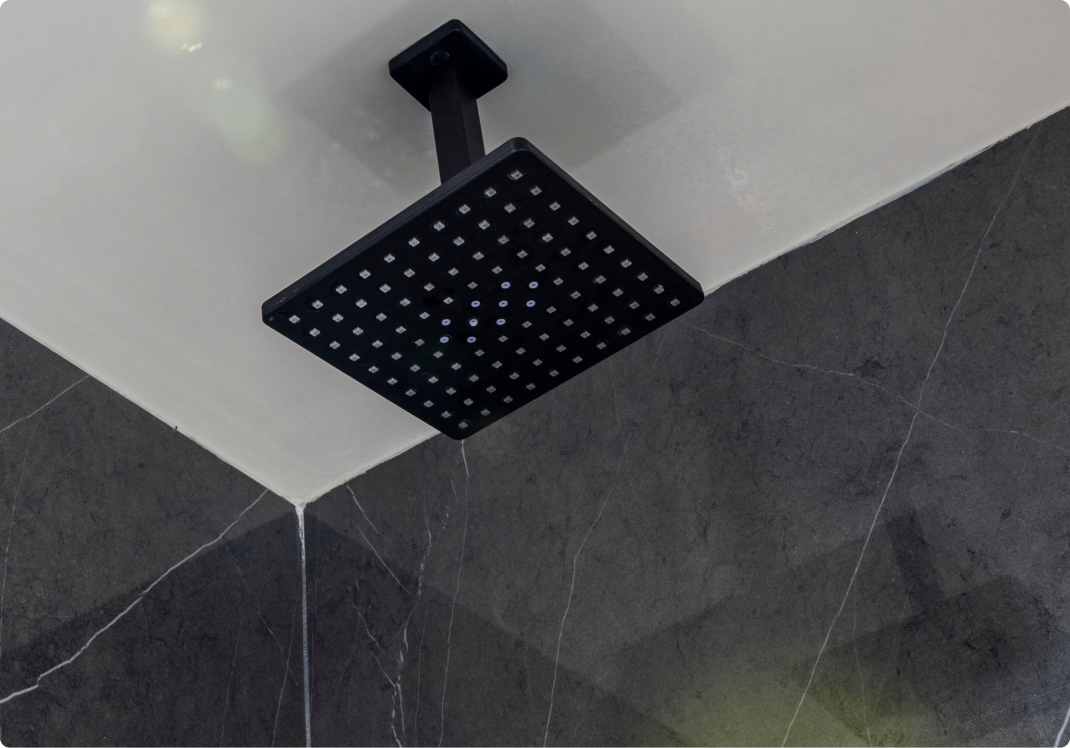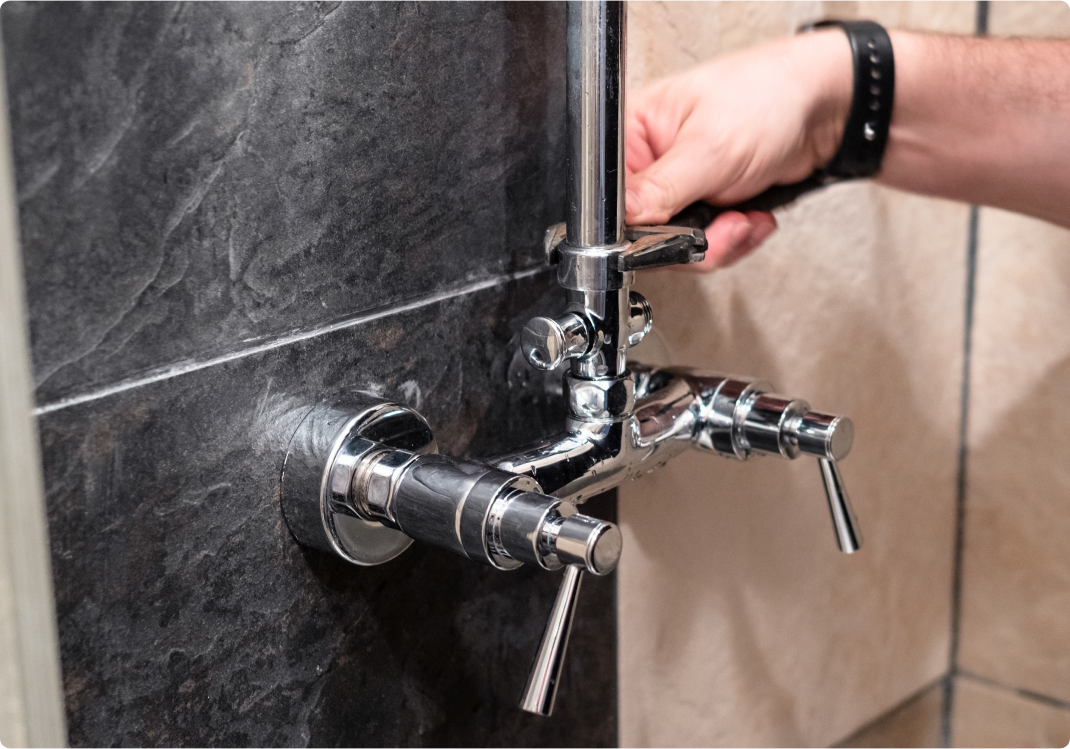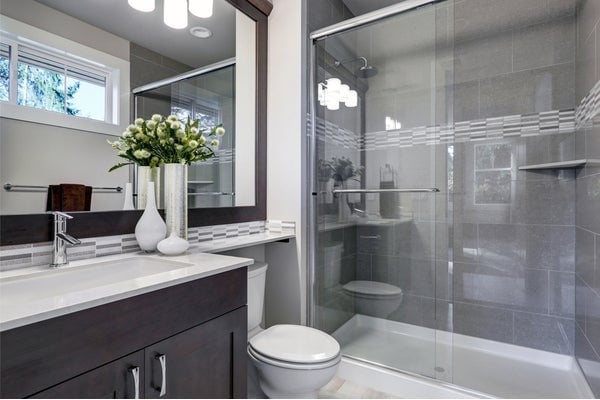Ceiling Mounted And Rain Shower Head Pros And Cons
Here are a few factors to take into consideration before replacing your current shower head:
Benefits of A Ceiling Mounted Shower Head
Whether you’re installing a new bathroom or remodeling an existing one, a ceiling-mounted shower head can be an attractive option thanks to the benefits it offers:
1. Style
The sophisticated design of these fixtures can give your bathroom a chic, elegant look.
2. Versatility
Many ceiling-mounted shower head models feature different water settings, from a pulsating massage to a water-saving trickle, with several modes in between.
3. Coverage
If you are standing under a ceiling-mounted shower head, there’s no need to twist, turn or stoop. Because the water is falling directly from above, it hits every part of your body at the same time.
4. Conservation
A ceiling-mounted shower head also saves water. Today’s high-efficiency shower heads typically release less than 2.5 gallons of water per minute, while older models often spray about 5.5 gallons per minute.
For more savings, look for a shower head bearing the WaterSense label. These units have been certified by the Environmental Protection Agency (EPA) to use no more than 2 gallons per minute. That saves the average family about 2,900 gallons of water each year.
Drawbacks of A Ceiling-Mounted Shower Head
Some of the complaints we hear about these shower heads include:
1. Lack of Settings
Many rain shower heads offer only one function. So, if you enjoy switching the mister or using a jet setting, these may not be the shower heads for you.
2. Water Pressure Requirements
Because these shower heads are larger than the typical models, they require strong water pressure. If your bathroom is notorious for low water pressure, address that before investing in a ceiling mounted shower head.
3. Strain On Your Water Heater
Since a ceiling shower head can use more water in a given shower, your water heater may struggle to keep up with your family’s demand.
Bottom line: If you’re wondering, Are ceiling shower heads good?, it really comes down to personal preference.
Things To Consider With a Ceiling Shower Head
Choosing a ceiling shower head might seem simple and straightforward enough, but you'll want to weigh the following factors when deciding which model to purchase, especially if you’re considering multiple ceiling shower head ideas.
1. Do you have enough room?
Consider whether your shower stall or tub is large enough to handle all that “rainwater.” The larger shower head means a larger area in your bathroom will be getting wet.
2. Should you mount it on the wall or ceiling?
Originally, all rainfall shower heads were ceiling mounted. However, running new plumbing to your bathroom's ceiling can be quite costly. Consequently, wall-mounted models are increasingly popular.
You can mount these shower heads in place of your older shower head, yet still get the overhead, rain-shower experience thanks to an adjustable arm that arches above your head.
3. What shape should you pick?
Rainfall shower heads are generally either round or square. Your choice will largely depend on your bathroom’s existing décor.
Typically, square heads work better with contemporary bathrooms that feature many angular design elements — especially if one of them happens to be a rectangular (or square) bathtub.
4. How big should a ceiling shower head be?
Ceiling-mounted shower heads run anywhere from 6 to 12 inches in diameter. The larger the head, the more “rain” it produces. If your home's plumbing works on or requires lower water pressure, you might choose a smaller head that features fewer nozzles.
5. What functions do you prefer?
What type of spray do you want: firm and invigorating or soft and gentle? Rain, mist, or waterfall? If you’re the only one using the shower, pick a shower head with the dispersal pattern you like.
For a family, choose a multi-function head that can be tailored to suit everyone's individual preferences.
Top Ceiling Shower Head Ideas for 2024
If you’re picking out a new shower head, here are the most popular trends to pay attention to:
1. Smart Shower Heads
Smart shower heads come with a variety of tech-based advancements, including options for:
- Voice Activation - To start and stop the shower and even set the temperature with your voice.
- Smart Phone Connectivity - To remotely start, stop, and control the shower.
- Save Your Settings - To save your preferences to enjoy the ideal settings with every shower.
2. Ceiling Pendant Shower Heads
Pendant shower heads add an extra layer of sophistication—while really helping you enjoy the “rain” from above.
3. Body Spray Add-Ons
Body spray add-ons offer extra shower heads to hit your body from the sides, allowing you to enjoy an incredible spa-like experience.
Are Rain Shower Heads Worth It?
In many cases, yes, a rain shower head is worth the investment. Many of these shower heads start around $50. Although some options cost hundreds of dollars, many fit into the average household’s budget, offering a taste of luxury at an affordable price.
Choose AHS® To Protect Your Shower—And Home
Whichever shower head you choose, consider also purchasing an American Home Shield® home warranty. Our home warranty plans help cover the cost of home system and appliance repairs.
You’ll also find coverage for plumbing, including faucets and valves.
So, go ahead. Update that bathroom—and be confident your investment is protected.




